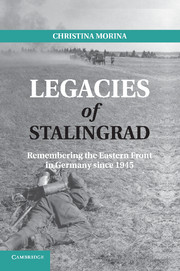5 - The Past Reinforced
The Memory of the Eastern Front from Ulbricht to Honecker
Published online by Cambridge University Press: 07 October 2011
Summary
The most important lesson from World War II is to prevent a new war, to fight against it before the weapons speak.
Erich Honecker (1985)June 22, 1941, a key date in World War II history, was also a date that left its mark on individual biographies. The protagonists of the last two chapters – the political leaders in East and West Germany during the last two decades of the Cold War – remembered the invasion of the Soviet Union both as a turning point in world history and as an unforgettable moment in their own personal histories. In their writings and speeches, one can find differing recollections of that day, some recorded in the immediate aftermath of the war and thus laden with the vehemence of an eyewitness account, some written many years later and thus clearly infused with political calculation and references to contemporary concerns. Walter Ulbricht (1893–1973), chancellor Helmut Schmidt (b. 1918), federal presidents Walter Scheel (b. 1919) and Richard von Weizsäcker (b. 1920) personally experienced the war against the Soviet Union: Ulbricht, already in his fifties at the time, as an antifascist front agitator on the Soviet side, Schmidt, Scheel, and Weizsäcker as Wehrmacht soldiers in their early twenties. The young communist youth leader Honecker (1912–94) spent most of the Nazi years in a prison in Brandenburg-Görden outside Berlin, while chancellor Kurt-Georg Kiesinger (1904–88), a member of the Nazi Party between 1933 and 1945, served in the radio division of Ribbentrop’s Foreign Ministry. Willy Brandt (1913–92), the first social democratic chancellor of the FRG, fled Germany in 1933 as a young historian and journalist, was expatriated in 1938, and fought in the Norwegian resistance movement. Federal president Gustav Heinemann (1899–1976) joined the anti-Nazi movement Bekennende Kirche in the 1930s, and he remained a critical pacifist protestant throughout his political career. Finally, the biography of chancellor Helmut Kohl (b. 1930) was shaped by what he called the “mercy of late birth.” He was the first West German leader to be born late enough to avoid becoming a potential accomplice of the Nazi regime or having to fight a war in the name of National Socialism.
- Type
- Chapter
- Information
- Legacies of StalingradRemembering the Eastern Front in Germany since 1945, pp. 175 - 192Publisher: Cambridge University PressPrint publication year: 2011



